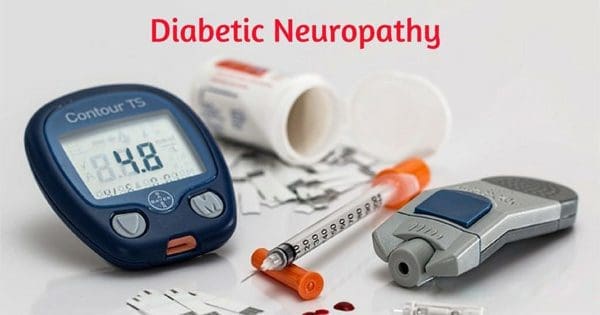According to the Center for Disease Control and Prevention, approximately 29 million type 2 diabetes cases have currently been diagnosed in the United States, where another 8.1 million cases are undiagnosed. Diabetes can have various serious complications, including the development of diabetic peripheral neuropathy.
The U.S. Department of Health and Human Services stated that between 60 and 70 percent of individuals diagnosed with diabetes have some form of neuropathy. Patients with diabetes often report experiencing symptoms of pain and discomfort, while other may report minor or no symptoms at all. Nerve damage can even manifest up to 10 years after being diagnosed with diabetes.
Table of Contents
Causes of Neuropathy
Diabetic neuropathy can occur due to an extended period of elevated blood sugar levels. High, unregulated blood glucose can cause injury to the vessels that supply the body’s nerves with the proper nutrition and oxygen they require to function accordingly. Over time, the nerves can become damaged, impairing the nervous system’s ability to communicate effectively. The symptoms of peripheral neuropathy can vary greatly depending on the severity and extent of the nerve damage.
According to the U.S. Department of Health and Human Services, the majority of individuals with diabetes  experience moderate to severe nerve injury. The symptoms of neuropathy generally manifest in the legs and feet, gradually manifesting in the arms and hands over time.
experience moderate to severe nerve injury. The symptoms of neuropathy generally manifest in the legs and feet, gradually manifesting in the arms and hands over time.
Symptoms of Neuropathy
Peripheral neuropathy is frequently identified by its set of characteristic symptoms, although each can differ from person to person. The symptoms experienced by the individual will depend largely on the location and severity of the nerve damage. The most common symptoms of neuropathy include: pain and discomfort, tingling sensations or numbness; burning sensations; loss of balance; sensitivity; and trouble sleeping. Each symptoms can also vary depending on the grade of severity and progression of the condition.
Pain and Discomfort
Many patients with diabetes commonly describe feeling sudden and sharp symptoms of pain shoot through their extremities. Other people may feel severe, cramping pain along their muscles. This variety of symptoms occur in the muscles of the feet, calves, hands and/or forearms. The pain and discomfort caused by diabetic neuropathy can also frequently result in muscle weakness, causing patients to struggle to hold items as a result of their symptoms.
Tingling Sensations or Numbness
Tingling sensations and numbness are also some of the most commonly reported symptoms of peripheral neuropathy in patients with diabetes. Tingling in the hands and/or feet can feel the same as when one of your limbs falls asleep. It may also feel as if you’re wearing a glove or sock when you’re not. Numbness results in the inability to feel your hands and feet. This can ultimately be a difficult situation for some people as this can often lead to puncture wounds in the feet when walking barefoot. The risk of foot injuries can be especially dangerous to patients diagnosed with diabetes because the presence of neuropathy as well as poor blood circulation can make wounds troublesome to heal. Wounds that don’t heal properly can be exposed to infections. In serious cases, these infections may lead to amputations.
Burning Sensations
Many diabetic neuropathy sufferers describe burning sensations, followed by several of the previously mentioned symptoms, especially in their feet. The burning pain is generally described as being bitten by fire ants or worse. Some patients report feeling as if their feet are on fire. Patients frequently soak their feet in an ice bath to achieve relief, however, the solution is unfortunately only temporary.
Loss of Balance
Loss of balance and coordination is another common sign of peripheral neuropathy caused by diabetes. This is the single largest complication which can result in life threatening accidents and injuries, especially among older adults. Muscle weakness may typically affect the strength, mobility and flexibility of the ankle, altering an individual’s gait.
Sensitivity to Touch
Diabetic neuropathy can often overload regular sensations, resulting in an extreme sensitivity to touch. Many patients with peripheral neuropathy describe being unable to tolerate the weight of their bed sheets against their legs, sometimes even the sensation of clothing against their skin can create tremendous discomfort. Holding a cup of warm coffee may feel painfully hot for some people with neuropathy or it could actually hurt if a person with cold hands touches their skin. Also, their hands or feet may feel hot or cold for no reason.
Difficulty Sleeping
Because the symptoms of peripheral neuropathy can often worsen at night, these can begin to interfere with a person’s ability to get a good night’s rest. This occurs due to a couple of reasons. Foremost, people who have been very active throughout the day can aggravate the inflammation on the nerves, increasing the pain, discomfort, and other symptoms of the condition. Subsequently, when settling down to sleep, the stimulus of the body decreases drastically, causing the signals of pain to become more pronounced than they were during the day. This can cause a person’s pain perception to be more intense, interrupting their capability to fall asleep or stay asleep.
Types of Neuropathy
There are several different types of neuropathy, or nerve damage, each with their own set of causes and symptoms, although the majority share most of the common characteristics associated with nerve injuries.
Peripheral Neuropathy
Peripheral neuropathy primarily affects the legs, feet, toes, arms and hands. When a person has developed type 2 diabetes, the damage to the nerves caused by this type of neuropathy will generally affect the legs and feet before it extends to the arms and hands. The symptoms of peripheral neuropathy largely depend on which area of the peripheral nerves, or central nerves, have suffered damage or injury.
Damage to the motor portion of the nerve can manifest as cramping, muscle weakness and/or muscle wasting. This can often lead to alterations in the patient’s balance, mobility and gait. Injury to the sensory portion of the nerve can manifest as tingling sensations, numbness, burning pain and/or sensitivity to touch, where many people describe being unable to tolerate bed sheets on their legs.
Autonomic Neuropathy
Autonomic neuropathy is associated with damage or injury to the nerves in charge of regulating the automatic and semi-automatic functions of the body, including digestion, bladder and bowel functions, heart function and sexual function. This type of neuropathy will affect the proper function of the automatic nerve responses in the body’s internal organs. Individuals who develop autonomic neuropathy due to type 2 diabetes may experience issues digesting food, breathing, urinating or incontinence and/or sexual problems, such as impotence.
Complications related with autonomic neuropathy can also make it difficult for medical professionals to determine when a patient’s blood sugar levels have become too low. Symptoms of hypoglycemia, such as sweating and heart palpitations can be easily detected, however, those symptoms can be concealed by nerve damage.
When autonomic neuropathy begins to affect the digestive system, individual’s can experience constipation, trouble swallowing or gastroparesis, a disorder which causes a delay in digestion. Gastroparesis can also gradually worsen over time, leading to debilitation caused by frequent nausea and vomiting. Delayed digestion can also make keeping track of glucose levels in the body a challenge. In more serious cases, gastroparesis can cause a patient to have to subsist on a liquid diet or be fed through a feeding tube.
Nerve damage to the cardiovascular system can alter a person’s heart rate and blood pressure. People with type 2 diabetics resulting in autonomic neuropathy may experience a drop in blood pressure after sitting or standing, causing them to feel light headed and dizzy.
Nerve injury to the urinary tract and sex organs can cause difficulty controlling urination and sexual functions. Neuropathy affecting the bladder may cause incontinence or can make it more difficult to fully empty. Autonomic neuropathy also decreases sexual function, leaving men without the ability to become erect and women with vaginal dryness and/ difficulty achieving orgasm.
Proximal Neuropathy
Proximal neuropathy can also commonly affect people with type 2 diabetes, especially older adults. It primarily affects the hips, thighs, buttocks or legs and generally develops on one side of the body. This type of neuropathy can weaken the legs. In serious cases, a person may lose sufficient muscle tone where they will no longer be able to stand from a sitting position without assistance. Proximal neuropathy is often described to be very painful.
What Can You do if You have Neuropathy?
Currently, about 29.1 million Americans have been diagnosed with diabetes in the United States. According to the Center for Disease Control and Prevention, or CDC, it’s estimated that approximately 38 percent of Americans may also have pre-diabetes. Of these million, about 70 percent can or may develop some form of neuropathy as a result of the condition. While these statistics can be shocking, there’s several steps you can take to increase and maintain your health and wellness once you’ve been diagnosed with diabetes or pre-diabetes.
- Eat low glycemic index foods. This will allow your glucose levels to substantially decrease.
- Minimize grain and other starch consumption to no more than 2 servings per day. For example, you may have a small serving of oatmeal for breakfast (men- 1 cooked cup / women 1/2 cup, cooked) and rice with lunch (same portion size as oatmeal). Eliminate any starches at dinner time. Eat only protein, non-starchy vegetables and good fat.
- Avoid Trans fats (hydrogenated and partially hydrogenated oils) and vegetable oils (sunflower, safflower, soybean oil, corn oil, canola oil, peanut oil). Use Ghee (clarified butter), coconut oil or extra virgin olive oil.
- Start exercising. You don’t necessarily have to find a gym. Start by walking around your neighborhood. If your balance and stability is poor, make sure to take your cane or walker with you and stay on even surfaces. Exercising will help increase your insulin sensitivity.
- Get adequate sleep (7-8 hours). Even one night of inadequate sleep can raise your insulin resistance. This is because the stress hormone, cortisol, is elevated. This will cause you to crave more carbs, but even when you eat them, you will feel worse afterward because your glucose tolerance has been reduced. If you’ve had a poor nights sleep, it’s especially important to eat low glycemic index foods.
In addition to keeping blood sugar levels within a healthy range, research studies have demonstrated that controlling blood pressure to avoid complications from diabetes can be just as important. In 2010, the British Medical Journal stated, “In patients with type 2 diabetes, the risk of diabetic complications was strongly associated with raised blood pressure.” Any reduction in blood pressure is likely to reduce the risk of other issues, with the lowest risk being in those with systolic blood pressure less than 120 mm/Hg. If you follow the steps above, however, your blood pressure will naturally begin to decrease.
Diabetic Neuropathy Can Be Reversed
The reality is that the various forms of diabetic neuropathy don’t necessarily cause death. There are many clinical studies published in widely respected journals, such as the Journal of Neurology and the British Medical Journal, which show effective treatments that reverse the damage to peripheral nerves, including chiropractic care.
For more information, please feel free to ask Dr. Jimenez or contact us at 915-850-0900 .
By Dr. Alex Jimenez
TRENDING TOPIC: EXTRA EXTRA: New PUSH 24/7®? Fitness Center
Post Disclaimer
Professional Scope of Practice *
The information on this blog site is not intended to replace a one-on-one relationship with a qualified healthcare professional or licensed physician and is not medical advice. We encourage you to make healthcare decisions based on your research and partnership with a qualified healthcare professional.
Blog Information & Scope Discussions
Welcome to El Paso's Premier Wellness and Injury Care Clinic & Wellness Blog, where Dr. Alex Jimenez, DC, FNP-C, a board-certified Family Practice Nurse Practitioner (FNP-BC) and Chiropractor (DC), presents insights on how our team is dedicated to holistic healing and personalized care. Our practice aligns with evidence-based treatment protocols inspired by integrative medicine principles, similar to those found on this site and our family practice-based chiromed.com site, focusing on restoring health naturally for patients of all ages.
Our areas of chiropractic practice include Wellness & Nutrition, Chronic Pain, Personal Injury, Auto Accident Care, Work Injuries, Back Injury, Low Back Pain, Neck Pain, Migraine Headaches, Sports Injuries, Severe Sciatica, Scoliosis, Complex Herniated Discs, Fibromyalgia, Chronic Pain, Complex Injuries, Stress Management, Functional Medicine Treatments, and in-scope care protocols.
Our information scope is limited to chiropractic, musculoskeletal, physical medicine, wellness, contributing etiological viscerosomatic disturbances within clinical presentations, associated somato-visceral reflex clinical dynamics, subluxation complexes, sensitive health issues, and functional medicine articles, topics, and discussions.
We provide and present clinical collaboration with specialists from various disciplines. Each specialist is governed by their professional scope of practice and their jurisdiction of licensure. We use functional health & wellness protocols to treat and support care for the injuries or disorders of the musculoskeletal system.
Our videos, posts, topics, subjects, and insights cover clinical matters, issues, and topics that relate to and directly or indirectly support our clinical scope of practice.*
Our office has reasonably attempted to provide supportive citations and has identified the relevant research studies or studies supporting our posts. We provide copies of supporting research studies available to regulatory boards and the public upon request.
We understand that we cover matters that require an additional explanation of how they may assist in a particular care plan or treatment protocol; therefore, to discuss the subject matter above further, please feel free to ask Dr. Alex Jimenez, DC, APRN, FNP-BC, or contact us at 915-850-0900.
We are here to help you and your family.
Blessings
Dr. Alex Jimenez DC, MSACP, APRN, FNP-BC*, CCST, IFMCP, CFMP, ATN
email: coach@elpasofunctionalmedicine.com
Licensed as a Doctor of Chiropractic (DC) in Texas & New Mexico*
Texas DC License # TX5807
New Mexico DC License # NM-DC2182
Licensed as a Registered Nurse (RN*) in Texas & Multistate
Texas RN License # 1191402
ANCC FNP-BC: Board Certified Nurse Practitioner*
Compact Status: Multi-State License: Authorized to Practice in 40 States*
Graduate with Honors: ICHS: MSN-FNP (Family Nurse Practitioner Program)
Degree Granted. Master's in Family Practice MSN Diploma (Cum Laude)
Dr. Alex Jimenez, DC, APRN, FNP-BC*, CFMP, IFMCP, ATN, CCST
My Digital Business Card



